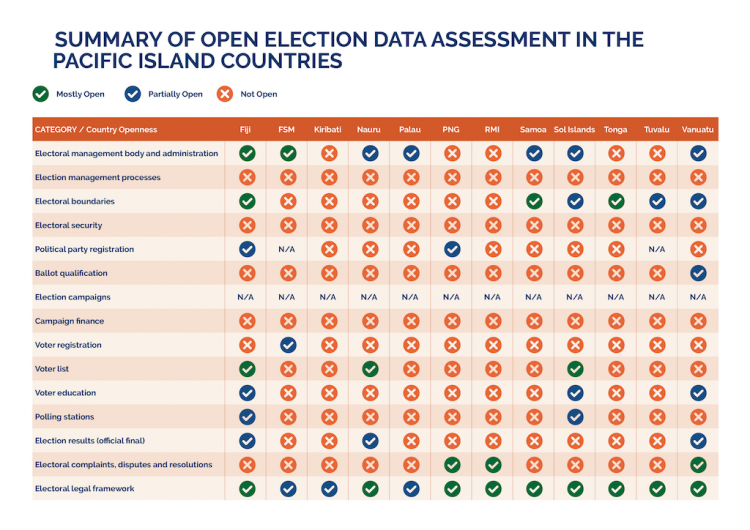Promoting Election Integrity in the Pacific Island Countries: Baseline Assessment of Open Election Data
Overview of Findings and Recommendations
While many observers focus on the day of voting, elections are much more than a singular event—they are a process in which public confidence in the results can be either strengthened or eroded over the long periods of time between them. In order for citizens to participate in, understand, evaluate, and ultimately accept an election process and its outcome, election data must be open to citizens. If integrity is what you do when no one is watching, transparency during the periods before, during and after elections speak to the overall quality of an electoral process.
As a supporter of the Open Government Partnership (OGP), NDI has a keen interest in ensuring that critical electoral data is available, and in helping stakeholders use that data to enhance the integrity of elections and hold election management bodies (EMBs) and other electoral actors to account. With support from USAID, NDI conducted a baseline assessment of election data in 12 Pacific Island Countries over the course of 2021, analyzing official information available to the public on the most recent general elections as part of its Open Election Data Initiative (OEDI).
The assessment shows that a few EMBs have started to facilitate real-time access to key election data, although some still struggle to provide minimal information online. Making data available for free on the internet is the easiest, fastest, and most open way for the public to access information. See the chart below for more detail on data openness across the measured categories in the target countries.
Opaque electoral processes can make Pacific Islands more vulnerable to a number of long-term risks.
Principal to these risks is the progressive deterioration of the rule of law. Unless citizens are assured that they can participate in electoral processes free from the harms of violence, intimidation, and threat of political retribution, they will continue to disengage from the political process.
Growing disinformation can become a key catalyst in undermining election credibility. In countless countries, rumors take root in a vacuum of reliable or easily referable data. In the absence of accurate, timely data, political polarization and a lack of confidence in EMBs can lead some to violently reject the outcome of elections.
Finally, countries in the region can face increased vulnerability to democratic backsliding in the absence of strong commitments to open and transparent government. Democratic institutions and processes remain challenged both in states in formation and in countries that analysts describe as “strong states but weak democracies.” Unclear legal frameworks, a lack of administrative impartiality, and limited space for domestic election observation can affect citizens’ effective political participation and public oversight of the integrity of elections.
To address these risks, NDI suggests several recommendations for various stakeholders in the region.
To protect electoral integrity, governments should follow through on international and regional commitments on transparency and accountability. Creating coherent legal frameworks on campaign regulations and disclosure requirements is critical. Responsible authorities should also improve access to public-interest information on the process and timelines for accepting petitions, solving electoral disputes and conducting investigations into electoral violence.
Political parties and candidates should move toward more policy-driven approaches that utilize open communication with voters. Parties should make transparent their campaign finances by releasing detailed and complete funding and expenditure information, and publishing electoral platforms and other policy information to support voters’ decision making about candidates.
EMBs can make information more usable and practical by improving internal data collection practices. EMBs should also consider creating websites that are safe, functional, and do not require high-maintenance skills or costs to ensure a feasible avenue for citizens, political parties, CSOs, media, and other stakeholders to access and analyze key election data safely and continuously.
Citizens and civil society organizations (CSOs) can promote and expand the availability of official electoral information and ensure datasets are available in the most useful formats. Increasing a demand for—and expectations of—more and higher quality open data can improve transparency throughout government, and help socialize the public about how to interpret and assess official data.
Regional and bilateral partnerships can also be conducive to consolidating democratic practices, including strengthening the right to information of public interest. Donor countries, especially OGP members, should put transparency and integrity at the heart of all technical assistance programs, and create verification mechanisms to assess follow through in partner countries.
